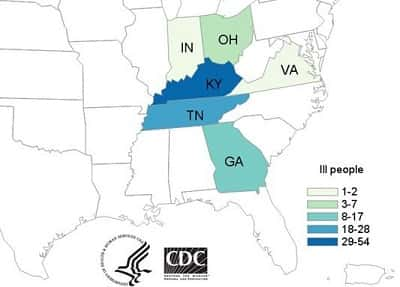
More than 100 people in six states, nearly half of them in Kentucky, are now reported to have been stricken in the current E. coli outbreak, according to the federal Centers for Disease Control and Prevention.
In new figures released Friday afternoon, the CDC says there have been 54 confirmed cases in Kentucky, 28 in Tennessee, 17 in Georgia, seven in Ohio, two in Virginia and one in Indiana, although additional cases are being investigated that may be part of the outbreak. The state Cabinet for Health and Family Services is reporting 55 cases in Kentucky.
The illnesses started on dates from March 2 to March 26, the CDC stated. Those affected range in age from 1 to 83 years, with a median age of 18. Fifty-three percent are female. Seventeen people have been hospitalized, and fortunately, no deaths have been reported. Eight of the hospitalizations have occurred in Kentucky, according to the CHFS.
The CDC reports that preliminary epidemiologic information suggests that ground beef is the source of this outbreak, with those stricken having reported eating ground beef at home and in restaurants. Traceback investigations are ongoing to determine the source of ground beef supplied to grocery stores and restaurant locations where ill people ate. At this time, no common supplier, distributor, or brand of ground beef has been identified.
In interviews conducted with 75 of those stricken with E. Coli about food they ate and other exposures in the week before they became ill, 63 (or 84 percent) reported eating ground beef. This percentage is significantly higher than results from a survey of healthy people.
Those who became ill bought or ate ground beef from several different grocery stores and restaurants. Many ill people bought large trays or chubs of ground beef from grocery stores and used the meat to make dishes like spaghetti sauce and sloppy joe.
At this time, the CDC is not recommending that consumers avoid eating ground beef. Consumers and restaurants should handle ground beef safely and cook it thoroughly to avoid foodborne illness. At this point, they are also not recommending that retailers stop serving or selling ground beef.
People usually get sick from E. coli, between two and eight days after swallowing the germ according to the CDC, with an average of three to four daysSymptoms often include severe stomach cramps, diarrhea (often bloody), and vomiting. In the most serious cases, those infected may get a type of kidney failure called hemolytic uremic syndrome, however no such cases have been reported in the current outbreak.
If you should develop symptoms, the CDC says talks to your healthcare provider, write down what you ate during the week before you became ill, report your illness to your local health department and assist investigators by answering questions about your illness.
Steps to prevent infection include:
- Washing hands after using the restroom or changing diapers, before and after preparing or eating food, and after contact with animals.
- Cook meat thoroughly to kill harmful germs. Cook ground beef, pork, and lamb to at least 160˚F. Cook steaks and roasts to at least 145˚F and let rest for 3 minutes after you remove meat from the grill or stove. Use a food thermometer to check the temperature of the meat.
- Keep raw meat separate from foods that won’t be cooked before eating. Thoroughly wash hands, counters, cutting boards, and utensils with soap after they touch raw meat to avoid contaminating other foods.
- Wash fruits and vegetables before eating, unless the package says the contents have been washed.
- Avoid raw milk, other unpasteurized dairy products and unpasteurized juices.
- Don’t prepare food or drinks for others when you are s
By Tom Latek, Kentucky Today








